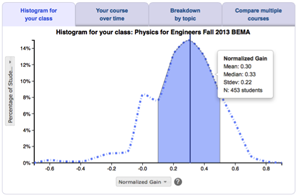
Developed by: Richard Hake




middle schoolhigh schoolintro collegeinter-mediateupper levelgrad school other

calc based

alg based

conceptual




Overview
What? Guided-inquiry, introductory mechanics labs designed to promote students' mental construction of concepts through conceptual conflict, kinesthetic involvement, analysis of experiments in multiple ways with increasing levels of sophistication, peer discussion, and Socratic dialogue with instructors.
Why? When well-implemented, SDI can promote much deeper conceptual understanding of Newtonian physics. Activities revolve around socially interactive problem-solving, which has been well-received by students. SDI provides valuable data points on day-to-day learning, often inaccessible in survey courses.
Why not? Becoming an accomplished SDI implementer requires time, commitment, and practice. In a large survey class, it would require a sufficient staff of trained "dialogists" to effectively float among student learning groups.
Student skills developed
- Conceptual understanding
- Lab skills
- Making real-world connections
- Using multiple representations
- Problem-solving skills
- Metacognition
Instructor effort required
- High
Resources required
- TAs / LAs
- Advanced lab equipment
- Tables for group work
Resources
Research
This is the third highest level of research validation, corresponding to:
- at least 1 of the "based on" categories
- at least 1 of the "demonstrated to improve" categories
- at least 1 of the "studied using" categories
Research Validation Summary
Based on Research Into:
- theories of how students learn
- student ideas about specific topics
Demonstrated to Improve:
- conceptual understanding
- problem-solving skills
- lab skills
- beliefs and attitudes
- attendance
- retention of students
- success of underrepresented groups
- performance in subsequent classes
Studied using:
- cycle of research and redevelopment
- student interviews
- classroom observations
- analysis of written work
- research at multiple institutions
- research by multiple groups
- peer-reviewed publication
References
- R. Hake, Promoting student crossover to the Newtonian world, Am. J. Phys. 55 (10), 878 (1987).
- R. Hake, Socratic pedagogy in the introductory physics laboratory, Phys. Teach. 30 (9), 546 (1992).
- R. Hake, Interactive-engagement methods in introductory mechanics courses, 1998.
- R. Hake, Interactive-Engagement Versus Traditional Methods: A Six-Thousand-Student Survey of Mechanics Test Data for Introductory Physics Courses, Am. J. Phys. 66 (1), 64 (1998).
- S. Tobias and R. Hake, Professors as physics students: What can they teach us?, Am. J. Phys. 56 (9), 786 (1988).




